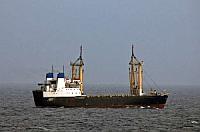 On March 29, 2010, the Panamanian-flagged ro/ro MV Iceburg 1 was hijacked by pirates about 10 nautical miles off the port of Aden, Yemen. Her crew of 24, of which 22 are believed to have survived, have been held hostage for 29 months. The ship’s owner Dubai-based Azal Shipping & Cargo has been accused of effectively abandoning the ship and her crew. One of the crew members, Wagdi Akram, committed suicide on October 27, 2010 by jumping overboard. The ship’s chief engineer is believed to have been killed by the pirates in March or June of 2011.
On March 29, 2010, the Panamanian-flagged ro/ro MV Iceburg 1 was hijacked by pirates about 10 nautical miles off the port of Aden, Yemen. Her crew of 24, of which 22 are believed to have survived, have been held hostage for 29 months. The ship’s owner Dubai-based Azal Shipping & Cargo has been accused of effectively abandoning the ship and her crew. One of the crew members, Wagdi Akram, committed suicide on October 27, 2010 by jumping overboard. The ship’s chief engineer is believed to have been killed by the pirates in March or June of 2011.
Abandoned at sea – the forgotten hostages of the Somali pirates
“The sailors’ plight is now on the conscience of everyone in shipping,” one shipping industry figure told The Sunday Telgraph. “The ordeal for the crew and their families is just unimaginable, yet there doesn’t seem to be anybody coming to their aid.”
The Iceberg 1 is one of several long-running hijackings on the Indian Ocean, and a stark reminder that despite reports earlier this month that the pirates’ activities are finally being curbed, some 177 hostages still remain in captivity, according to the latest figures.
While the success rate of Somali pirate attacks has dropped dramatically thanks to improved safety measures and the use of armed guards on ships, those crews that do fall into pirate hands are likely to be held for much longer and treated more harshly in a bid to extract higher ransoms. The average length of a hijacking now is eight months, according to the recent Oceans Beyond Piracy study, which also highlights incidents of crews being beaten and tortured.
Such hijacks take place under the nose of the international anti-piracy fleet, which is still struggling to curb the problem after nearly four years in operation. The fear of suffering casualties – especially civilian ones – means the foreign navies seldom attempt to free hijacked vessels by force, preferring to let ship owners negotiate ransoms instead.
The problem comes in cases like the Iceberg 1, when there is apparently no ransom cash to be had. The ship, for which the hijackers initially demanded an $8 million ransom, is owned by Dubai-based Azal Shipping & Cargo, whose management have been accused of leaving the crew to their fate. Until last month, Azal had declined to even meet with the hostages’ families, who say they have also refused to pay wages in absentia for the sailors, many of whom are the main breadwinners in their households.
Calls and emails by this newspaper to Azal have never been returned. Shipping industry sources have told The Sunday Telegraph, however, that they believe the firm did not have kidnap and ransom insurance, which is now considered essential for shipping through the Gulf of Aden. “It doesn’t seem like there has been anyone negotiating on the ship’s behalf at all,” observed one industry figure.
To show support for the crew of the MV Iceburg 1 “like” the MV Iceberg 1 Mariners Action Group on Facebook. Also follow Reid Strague’s Chain Locker blog for the latest news.
Thanks to Christina Sun for passing along the latest.

How terrible! I hope the rest of crew come out alright.
Thanks for posting this. I don’t see how a ship owner can get away with abandoning the crew. Shameful.
I’m afraid we need to take a stronger stance against terrorist groups that hijack ships. Let’s stop using the romantic term “pirates”. These groups are terrorists, period. Treat them as such and handle it swiftly. Azal Shipping & Cargo has a responsibility to the men manning their ship. Terrorist takeovers are part of doing business in shipping. They happily take in profits from these same men but now when the table has turned they have turned their backs (from what we’re being told). Unacceptable.
Someone once asked me, “if every time someone parked in a handicapped space and they were NOT handicapped, and two minutes after they stepped out of their car it blew up, how often would people continue to park in handicapped parking spaces?” As soon as the news hit the Internet you would see a sharp decline, and I’d venture to say, a complete stop to people w/o plackets parking in handicapped designated spaces. Ya, it’s harsh but until we regain the principles that held us to higher standards we may require harsher consequences.
BTW, I am in no way advocating blowing up cars parked in handicapped (or any other) spaces. It was a question posed to me to make a point and I thought it fit well in the discussion.